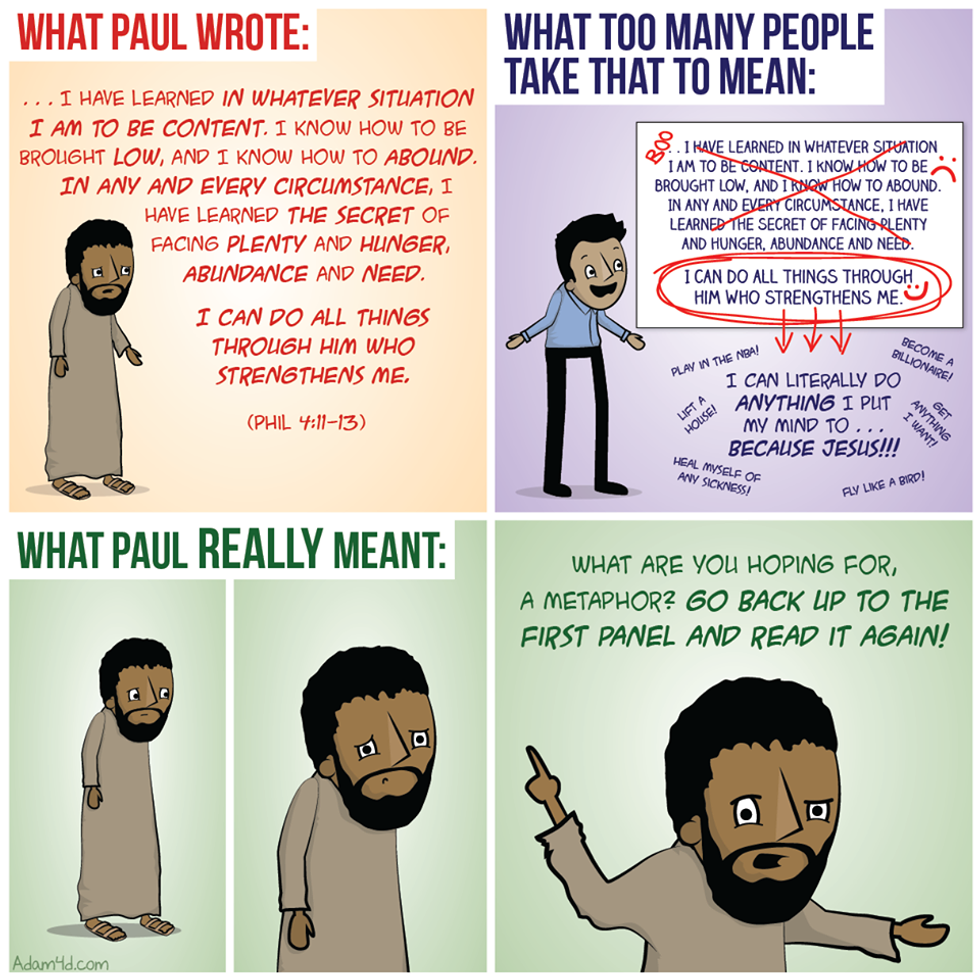There are a handful of Bible verses every knows. They pop up on t-shirts, phone backgrounds, tattoos, high school yearbook senior quotes, Facebook statuses, Instagram captions, and all that jazz. I affectionately refer to them as the "Pinterest verses," because if you search them on Pinterest you can find some pretty cute backgrounds, wall hangings, and other inspiration for living the most basic life possible.
These verses can often be recited by those with little Biblical knowledge and are, in many cases taken out of context and shaped to fit our current situations or to further our agendas (or to get more likes on Instagram photos). Many people are already aware of this, and someone came up with a cheeky cartoon to demonstrate:
I've chosen a four of the most popular verses, and I have done my own research to explain their true context.
Side note: I am not writing this to offend anyone or to tell anyone they're "wrong," but because I feel we are not appreciating these verses as best we could because they've become so cliche.
Jeremiah 29:11: For I know the plans I have for you,” declares the LORD, “plans to prosper you and not to harm you, plans to give you hope and a future.
What people think it means: "No matter what I do, even if I decide to skip all my classes even though I want to go to medical school, God's got me."
What it really means: The Book of Jeremiah is in the Old Testament, and is the record of occurrences from 627 BC. The book is intended for the Jews in Babylonian exile. The 29th chapter of Jeremiah is a letter to those who were exiled into Babylon from Jerusalem. 29:11 is a very small part of a deeply moving directive from God to His exiled people. He told them that he would supplicate their needs during their exile, but would not return for 70 years. Jeremiah 29:11 is God's sentence of encouragement to those who had been removed from their homeland that, even though they would be in discomfort for many years, he had not forgotten them.
1 Corinthians 13:4-7: Love is patient, love is kind. It does not envy, it does not boast, it is not proud. It does not dishonor others, it is not self-seeking, it is not easily angered, it keeps no record of wrongs. Love does not delight in evil, but rejoices with the truth. It always protects, always trusts, always hopes, always perseveres.
What people think it means: This is every girl's blueprint for a perfect man. Don't believe me? Check her Pinterest.
What it really means: 1 Corinthians is in the New Testament and is the disciple Paul's first letter to the believers in Corinth. People today tend to pull 13:4-7 out of context because it's a lot more warm and fuzzy that way. Read alone, it's a promise to us of how we should be treated, but to an extent, this is theologically incorrect. If you read 1 Cor 13 as a whole, it should be more convicting than anything, because we are the ones who should be charged to love. I like to periodically insert my own name in place of "love" in these verses (Catie is patient, Catie is kind, etc.), and if I can say these things but not truly believe them, I know I have work to do. Rather than looking for these qualities in others, we should first look for them within ourselves.
Philippians 4:13: I can do all things through Him who gives me strength.
What people think it means: See the above cartoon. People like to twist it so that it means that they can sprout wings and fly, or get into Harvard Law with a 2.4 undergrad GPA if they just have a little faith.
What it really means: Philippians is the letter from Paul and Timothy to the people of Philippi. "I can do all things" is likely nothing more than a bastardization of translation. As written in the New International Version, Paul gave his testimony to the Philippians, saying how he had overcome great struggles (and God knows he had; side note: Paul is my favorite disciple) through the strength he gained from God. Here's the text of the first paragraph of Phil 4:
I rejoiced greatly in the Lord that at last you renewed your concern for me. Indeed, you were concerned, but you had no opportunity to show it. I am not saying this because I am in need, for I have learned to be content whatever the circumstances. I know what it is to be in need, and I know what it is to have plenty. I have learned the secret of being content in any and every situation, whether well -ed or hungry, whether living in plenty or in want. I can do all this through him who gives me strength.
See? No skydiving without a parachute and hoping you can fly here.
By spending time truly immersing yourself in the Word rather than using verses you may have picked up on over the years as Instagram captions or trendy phone backgrounds, you can better appreciate the Bible and what it truly means to be a Christian.




















